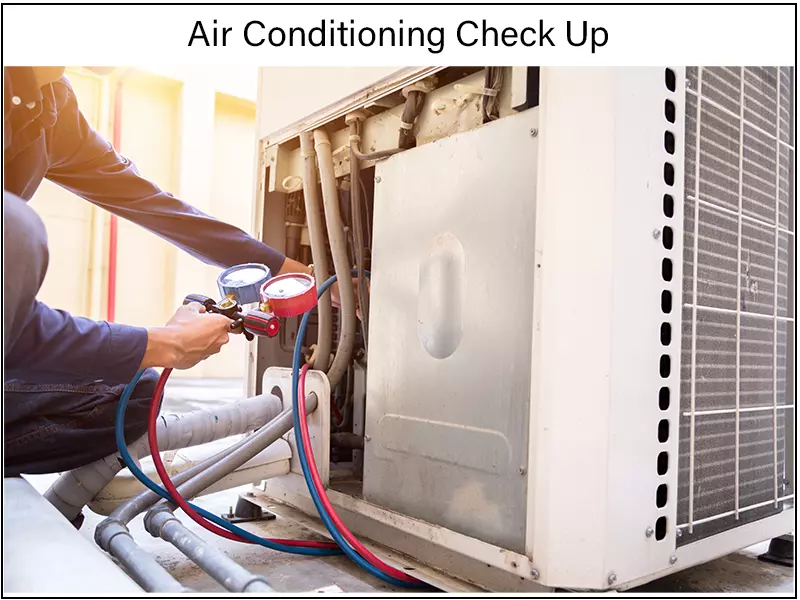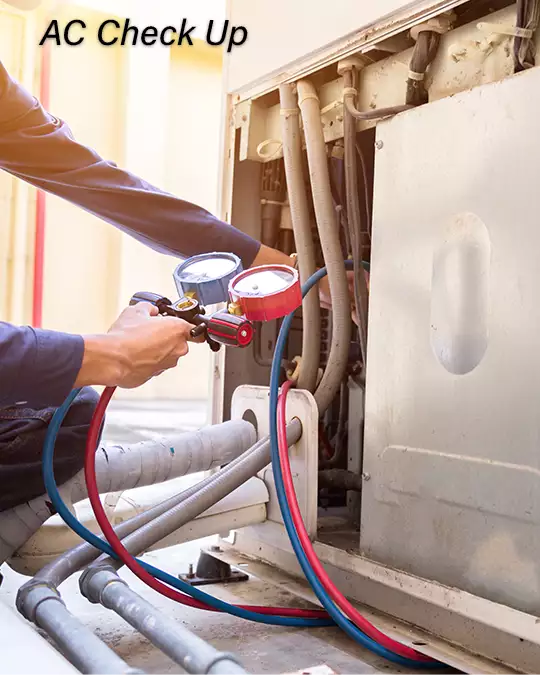

Will your AC Quit without Warning?
Most Homeowners Don't think about their Air Conditioning until it quits Working. Is the Annual Check-up or Tune-up the Best Attempt to Prevent Unexpected Failure?
We list (in no particular order) some of the Most Common Failures and will they be Discovered during a Check-up.
Filters
Some AC Pro's suggest changing the Filters every 45 days and no more than 90 days. Dirty Filters will reduce the Air Flow over the Evaporator Coil. Low Air Flow can cause other problems with the AC and also Shorten the Life of the Unit by over working.
Air Flow problems should be detected during a Check-up. In the Links below, see our Article "AC Filters" for information about Sizes and Filter Abilities.
Circuit Breakers
Your AC Circuit Breaker will be in the Breaker Box with all the other Breakers. Most Central AC Units will have 2 Breakers, 1 for the Outside Compressor Unit and 1 for the Air Handler inside the Home.
Circuit Breakers are very Reliable but are Subject to Failure. High Current Breakers can have loose Terminal Screws and will cause Heat that could Trip the Breaker. Tighten Up the Screw may Fix it or The Heat can get Bad enough to cause a Melt Down then stop the Flow of Electricity.
Breakers can be Tripped off when there is an Electrical Fault like a Short or the Equipment it operates take more Current than what is Normal. Like a Bad Fan, Compressor, Relay, Connector or Terminal.
All of these Electrical Problems will require a Professional to Repair and should be Detected during a AC Check Up. In the Links below, See our Article " Breakers" for more Information about Circuit Breakers.
Fuse or Disconnect
In addition to the Circuit Breaker Most if not All AC Units have a Quick Disconnect mounted close to the Outside Unit. This Disconnect is used by the Service People to Shut Off Power During a Service Procedure.
Disconnects connections can become loose after Time. This Failure will also cause Heat and the Connection will Fail.
Some AC Units will have Large Fuses that will be used for the Same Purpose. The Fuses will work only for so long before they Fail.
Checking & Replacing the Fuses or Disconnects will most likely call for a Professional to Check and Replace and may not be Detected during a AC Check Up.
Electrical Connections and Contacts
Inside the Condenser Unit and the Air Handler are Many Electrical Connections to Terminals, Contactors, Motors and Sensors. Each a Potential Problem.
AC Repair Companies will know what connections Fail and will Check them.
Contactors Have Contact Points that Close and Open during Normal Operation. The Contacts have a Slight Arc when Opening or Closing, Eventually the Points will no Longer Carry Electricity to the Appliance and will need to be Replaced.
Contacts and Contactors will most likely require a Professional to Check and Replace. These Electrical Problems could be Detected during a AC Check Up.
Capacitors
Capacitors have the Capacity to Store Energy. Your AC Unit uses a Large Capacitor to give the Compressor an Extra Jolt to get it Started from a Stop (Locked Rotor).
Capacitors have Storage Potential measured in Farads. Faulty or Weak Capacitors will not have enough Charge to Start a Motor to Operational Status, this will overload the Circuit Breaker then shut off.
Checking the Capacitor will require a Professional to Check and Replace, weak Capacitors should be Detected during a AC Check Up.
Refrigerant
Low Refrigerant will affect the Unit's ability to Cool properly. Low Refrigerant may not satisfy the Sensor so the Compressor will not Turn On.
If the Refrigerant is low there could be a Leak that will have to be Located and Repaired. Refrigerant should remain Stable in the Unit for many years.
Low Refrigerant will require a Licensed Professional to Check, Repair and Replace, This should be Detected during a AC Check Up.
Frozen Coil
Common reasons for Frozen Evaporator Coils may be Poor Air Flow caused by Dirty Filters, Low Fan Speed, Dirty Evaporator Coil because of improper Filters or No Filter, Drain Stoppage.
For Heat Pump Units the Condenser Coil may Freeze in Cold Weather caused by Condensation. This may not be a AC Malfunction and you could turn off the Unit and wait for the Frost to Melt. This may also be caused by a Defective Reversing Valve.
Beyond replacing the Filters you may have to call a Professional to Check and Repair, some of these Problems should be Detected during a AC Check-Up. A failing Reversing Valve may not be detected during a Check-up
Damaged Fan Blades
This most likely will happen to the Outside Unit. The Fan Pulls Air Through the Condenser Coil to Cool the Hot Refrigerant coming for the Compressor.
The Blades of the Fan should be adjusted to the Proper distance to get the Maximum Flow through the Unit
Broken or Cracked Fan Blades can be Detected by the Homeowner but you should have a Professional to Check and Repair, This should be Detected during a AC Check Up.
Fan Motors
There are 2 Fans in most AC Units. 1 is a Squirrel Cage Blower (Fan) located in the Air Handler. This Bower will Produce Large Volumes of Air to the Ducts that go throughout the House. This Air comes from Inside through the Filters over the Evaporator back into the Home.
The 2nd Fan is in the Condensing Unit Outside. Both Fans are Driven by Motors. Electric Motors are very Reliable but after years of operation they can Fail. Bearings may be the most common reason for Failure. The Motor will begin to make noise when operating.
Worn Bearings or High Current Draw should be Detected during a Check-up.
Bushes or Obstruction close the Outside Unit
Air Flow through the Condenser Coil is very important to Cool the Refrigerant before it enters the Expansion Valve. Having Bushes close to the Outside Unit will decrease the Air Flow.
It is Recommended at least 1 foot but I think 2 to 3 feet is Best. Hiding the Unit is desired by some Homeowners, be aware Bushes grow and may get Close without you realizing it.
Air Flow Obstruction will be discovered during a AC Check-up but as a Homeowner have them trimmed. A Puncture in the Condenser Coil could be Unit Replacement so be careful.
Clogged Condensation Drain
This can be a Bigger Problem than you think. Where we are Located most AC Installations include 2 Outside Drains from the Air Handler. Lower Drain is where the Condensate Normally Drains.
In the Event that this Drain Becomes Obstructed, the Drain Pan will begin to Fill to the Point that the Overflow Drain which is Higher Saves you from the Condensate coming through the Ceiling. If you see Water coming from the Upper Drain then you need to get the Drain Lines Checked.
This should be Detected during a AC Check-up. Homeowners may be able to clean out the Drain if it is easy to Access. In the Links below see our Article where 2 AC Drains were not able to work Properly and caused Ceiling Damage.
“In 1902 A 25 year old Engineer "Willis Carrier" from Buffalo NY, Invented the 1st Modern Air Conditioning System.”
© Copyright 2023 YPRemodel.com. All rights Reserved. This material may not be Published, Broadcast, Rewritten or Redistributed without written Permission.
